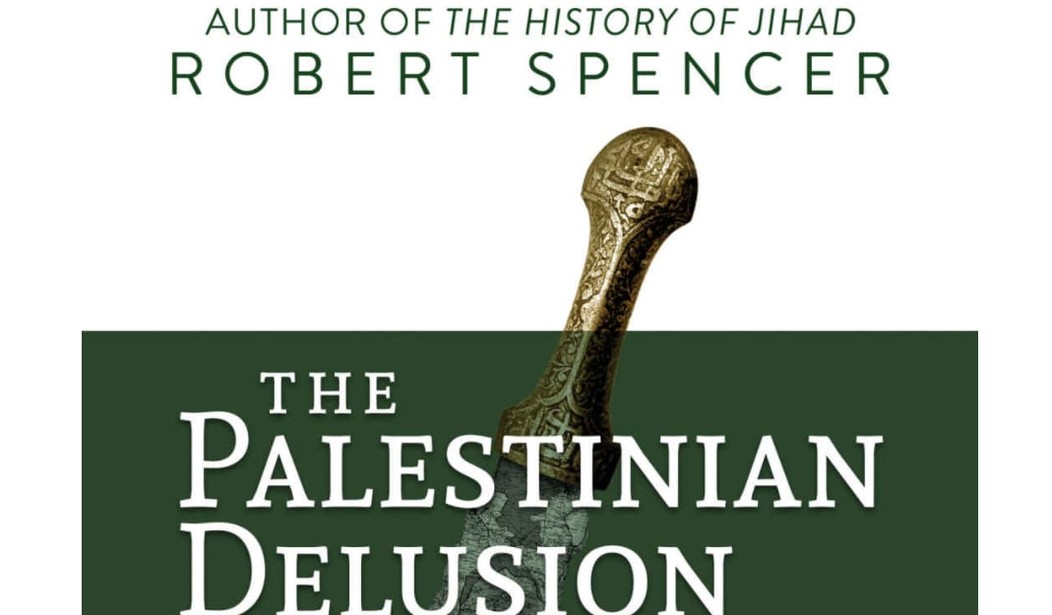True story: Last weekend I tried a new burger joint in Austin called BurgerIM. It’s Israeli-owned. I posted about it on Facebook and a friend in Michigan replied. BurgerIM had tried to open up a shop in Dearborn, Mich., but Palestinian protesters fought it – based solely on the fact that its owners are Jews – and BurgerIM pulled out. Jobs and opportunity lost to the decades-old Israel/Palestinian conflict.
I’m sure some are thinking that we wouldn’t have this problem if the Palestinians just had a homeland. Guess what? They do. Robert Spencer’s new book lays out the facts.
A major element of the Palestinian case against Israel is the claim that the Palestinians, not the Israelis, are not only the rightful owners of the land, but its original inhabitants. That’s just one of the commonly accepted falsehoods that Islamic scholar and historian Robert Spencer explodes in his new book The Palestinian Delusion: The Catastrophic History of the Middle East Peace Process. “No archaeological evidence, or evidence of any other kind, has ever been found to substantiate a link between the ancient Canaanites or Jebusites and the modern-day Palestinians,” he points out. “Palestine was the name of a region but never of a people or of a political entity.”
This fact, as Spencer shows, has enormous implications for the idea that the Palestinians are the rightful owners of the land of Israel today, or even of the West Bank and Gaza. Drawing on primary source and eyewitness data, Spencer succinctly sets out the history of the region. Yes, it was under Arab rule beginning in the seventh century, but Jews were there before that, and were still there when the Arabs gave way to the Ottoman Turks, and when the land became famously depopulated and desolate, as Mark Twain and numerous other travelers noted, all quoted by Spencer.
In the nineteenth century, the Zionist project led large numbers of Jews to return to their old homeland, which also led many Muslim Arabs to move there as well, in search of economic opportunity. At this point, the idea that had long been discussed in Britain and elsewhere, of giving Jews a “national home” (which may or may not take the form of a state) in Palestine began to gain traction, resulting in the Balfour Declaration of 1917, which put Britain on record saying there should indeed be such a Jewish national home. In 1922, the newly established League of Nations assigned the area to British administration as the Mandate for Palestine, precisely for the purpose of establishing this Jewish national home.
As Spencer recounts in detail, the idea met resistance from the beginning. T.E. Lawrence, the renowned “Lawrence of Arabia,” argued that the Muslim Arabs should receive some of the territory set aside for a Jewish national home, as a reward for fighting (for their own reasons) for the British against the Ottomans during World War I. Lawrence and his allies were successful: the British quickly gave the great part of the Mandate for Palestine land, the part east of the Jordan that forms the state of Jordan today, to the Muslim Arabs.
This stands the “stolen land” claim on its head. Jews didn’t steal land from Palestinians; it was the other way around. Jews were barred from settling east of the Jordan: it was to be a state for the Palestinian Arabs. And that is what it is, as Spencer shows: the Palestinian homeland already exists, but has not been recognized as such because the Palestinian refugees are useful to Israel’s enemies for propaganda purposes.
The most important part of The Palestinian Delusion is when Spencer explains why Muslim Arabs will not accept Israel as a Jewish state in any form, and why the Muslim Arabs in Palestine turned to violence at almost the very beginning of the Mandate period. He tells the shocking story of how pro-Arab British officials actually encouraged the Arabs to commit acts of violence, so as to turn British public opinion (and British officialdom) against a Jewish national home. The Arab leadership enthusiastically embraced this strategy, and the British responded by limiting Jewish immigration to the region.
With the Holocaust, however, everything changed, and when pro-Zionist Harry Truman became president of the United States, the state of Israel was able to declare its independence. The Israelis invited the Arabs who lived among them to become citizens of Israel. Instead, the Arab Higher Committee and the neighboring Muslim Arab states called for Israel’s destruction.
Spencer goes on to lay out what happened in the various episodes of the “Middle East Peace Process,” explaining why the Islamic imperative that neither Israel nor any non-Muslim entity had any right to exist on what was considered to be “Muslim land” overwhelmed any possibility that actual peace might be achieved in any of these initiatives. For decades, naïve leaders in the United States and Europe have accepted the claim that the Palestinians, that is, the Muslim Arabs of the region, who are actually no different culturally or ethnically from the Arabs of the surrounding region, hate Israel because it stole their land; in reality, however, as Robert Spencer proves here, the Palestinians and their allies hate Israel because doing so is an Islamic obligation.
The Israeli/Palestinian conflict is clouded over by a great deal of disinformation and falsehood. Robert Spencer’s superb book clears the delusions away, and gives the reader a solid dose of reality.
As for BurgerIM: Delicious. Try the jalapeno cheese fries.








Join the conversation as a VIP Member